Current Marine Corps Doctrine Borrows From History
VerifiedAdded on 2022/08/21
|7
|1450
|14
AI Summary
Contribute Materials
Your contribution can guide someone’s learning journey. Share your
documents today.
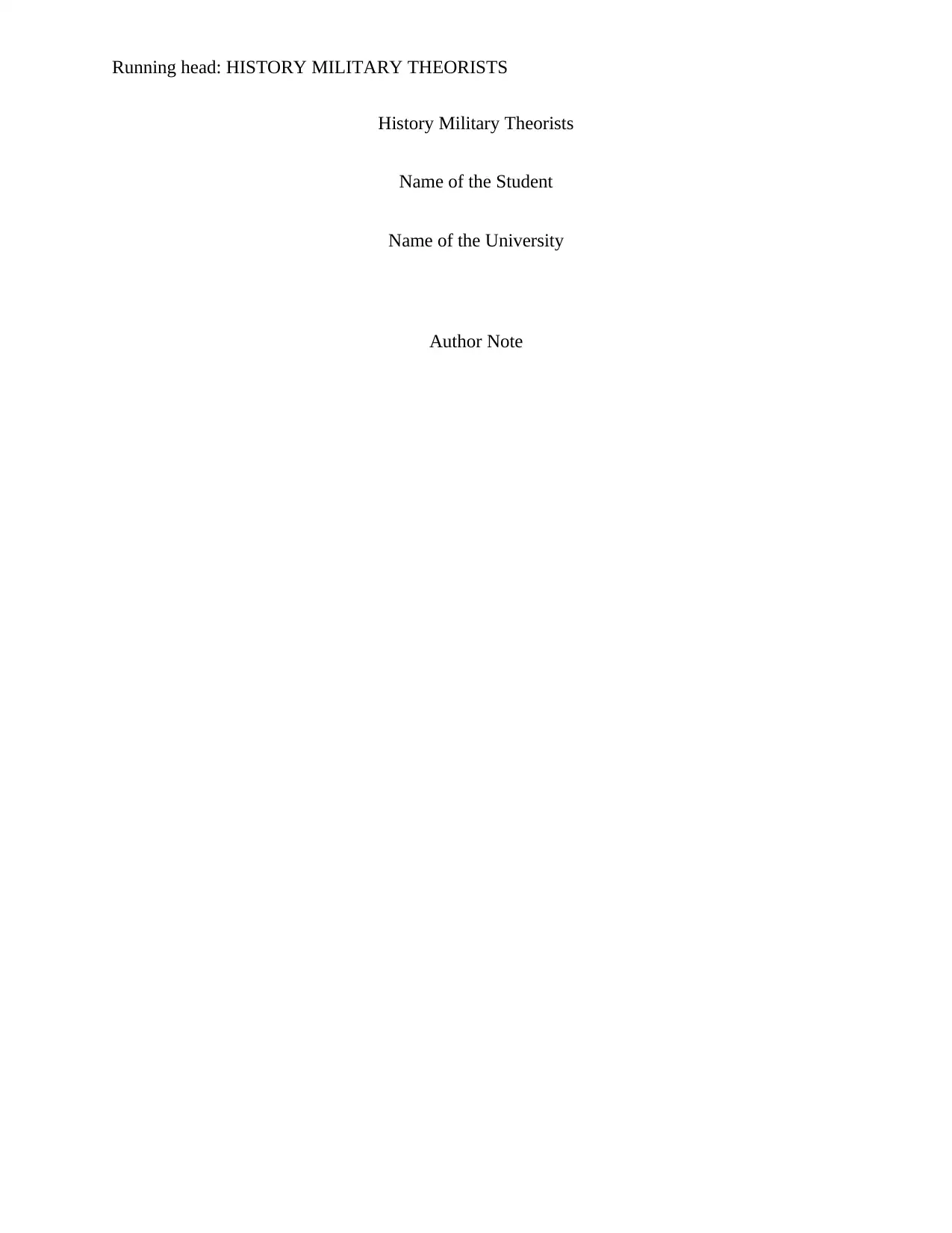
Running head: HISTORY MILITARY THEORISTS
History Military Theorists
Name of the Student
Name of the University
Author Note
History Military Theorists
Name of the Student
Name of the University
Author Note
Secure Best Marks with AI Grader
Need help grading? Try our AI Grader for instant feedback on your assignments.
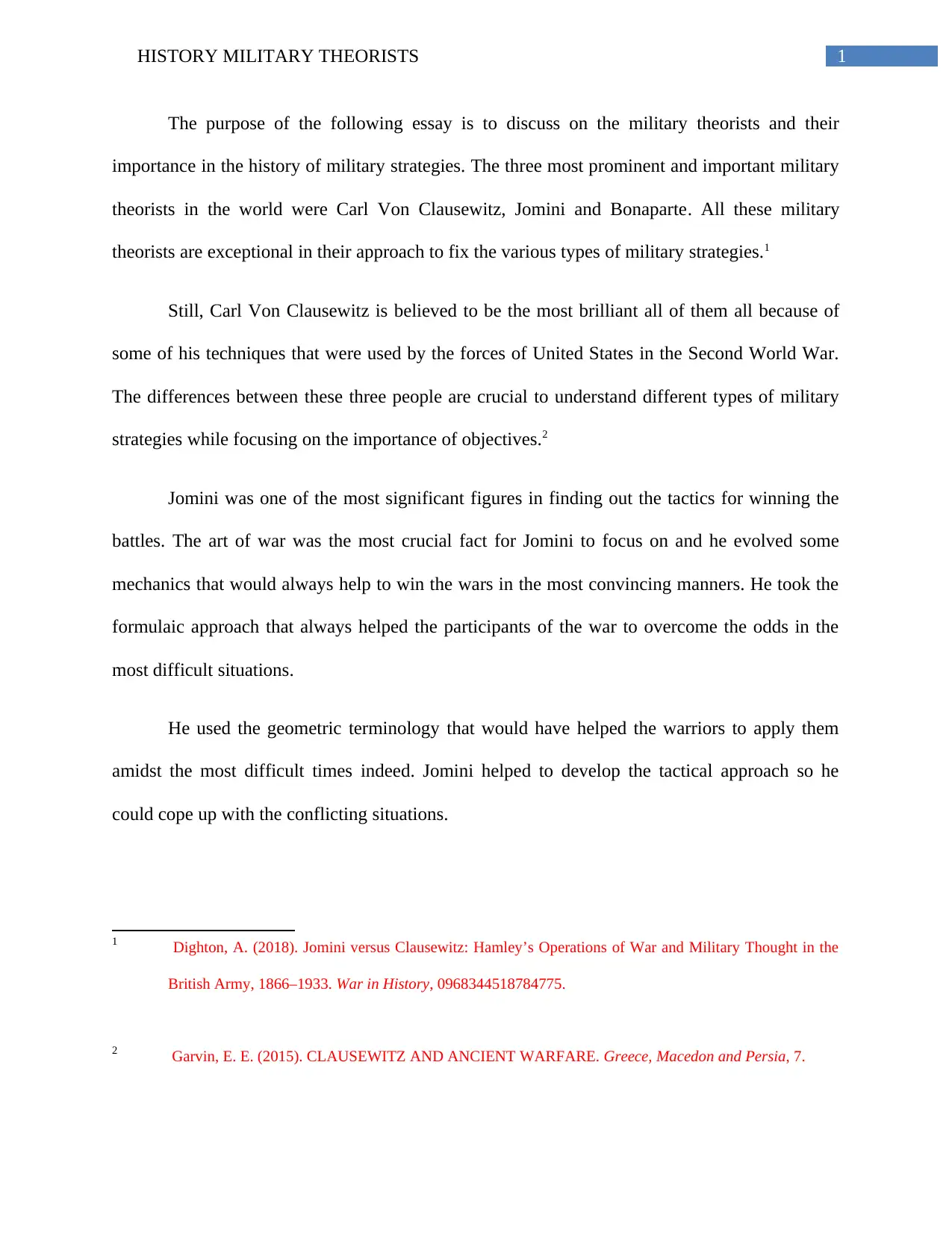
1HISTORY MILITARY THEORISTS
The purpose of the following essay is to discuss on the military theorists and their
importance in the history of military strategies. The three most prominent and important military
theorists in the world were Carl Von Clausewitz, Jomini and Bonaparte. All these military
theorists are exceptional in their approach to fix the various types of military strategies.1
Still, Carl Von Clausewitz is believed to be the most brilliant all of them all because of
some of his techniques that were used by the forces of United States in the Second World War.
The differences between these three people are crucial to understand different types of military
strategies while focusing on the importance of objectives.2
Jomini was one of the most significant figures in finding out the tactics for winning the
battles. The art of war was the most crucial fact for Jomini to focus on and he evolved some
mechanics that would always help to win the wars in the most convincing manners. He took the
formulaic approach that always helped the participants of the war to overcome the odds in the
most difficult situations.
He used the geometric terminology that would have helped the warriors to apply them
amidst the most difficult times indeed. Jomini helped to develop the tactical approach so he
could cope up with the conflicting situations.
1 Dighton, A. (2018). Jomini versus Clausewitz: Hamley’s Operations of War and Military Thought in the
British Army, 1866–1933. War in History, 0968344518784775.
2 Garvin, E. E. (2015). CLAUSEWITZ AND ANCIENT WARFARE. Greece, Macedon and Persia, 7.
The purpose of the following essay is to discuss on the military theorists and their
importance in the history of military strategies. The three most prominent and important military
theorists in the world were Carl Von Clausewitz, Jomini and Bonaparte. All these military
theorists are exceptional in their approach to fix the various types of military strategies.1
Still, Carl Von Clausewitz is believed to be the most brilliant all of them all because of
some of his techniques that were used by the forces of United States in the Second World War.
The differences between these three people are crucial to understand different types of military
strategies while focusing on the importance of objectives.2
Jomini was one of the most significant figures in finding out the tactics for winning the
battles. The art of war was the most crucial fact for Jomini to focus on and he evolved some
mechanics that would always help to win the wars in the most convincing manners. He took the
formulaic approach that always helped the participants of the war to overcome the odds in the
most difficult situations.
He used the geometric terminology that would have helped the warriors to apply them
amidst the most difficult times indeed. Jomini helped to develop the tactical approach so he
could cope up with the conflicting situations.
1 Dighton, A. (2018). Jomini versus Clausewitz: Hamley’s Operations of War and Military Thought in the
British Army, 1866–1933. War in History, 0968344518784775.
2 Garvin, E. E. (2015). CLAUSEWITZ AND ANCIENT WARFARE. Greece, Macedon and Persia, 7.
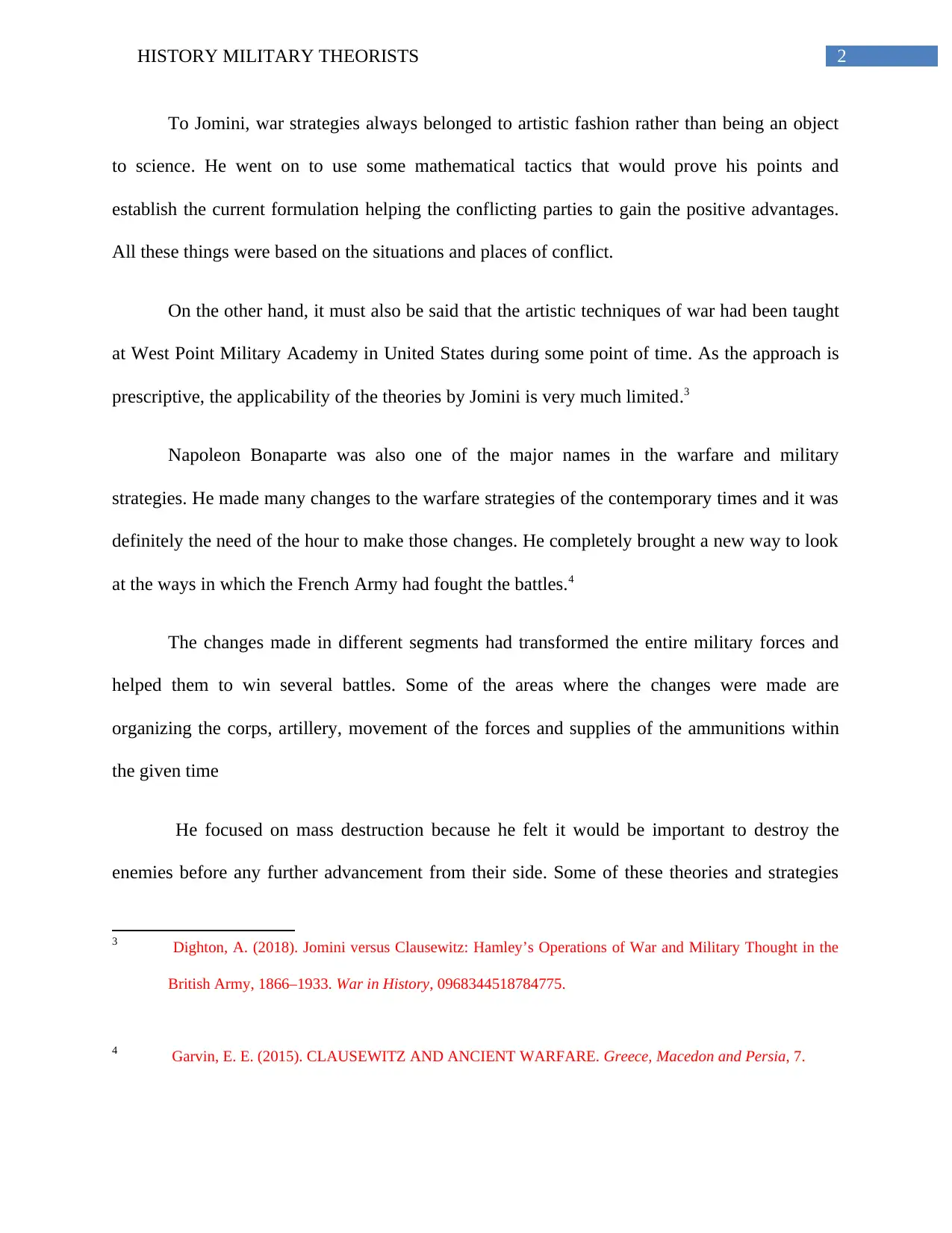
2HISTORY MILITARY THEORISTS
To Jomini, war strategies always belonged to artistic fashion rather than being an object
to science. He went on to use some mathematical tactics that would prove his points and
establish the current formulation helping the conflicting parties to gain the positive advantages.
All these things were based on the situations and places of conflict.
On the other hand, it must also be said that the artistic techniques of war had been taught
at West Point Military Academy in United States during some point of time. As the approach is
prescriptive, the applicability of the theories by Jomini is very much limited.3
Napoleon Bonaparte was also one of the major names in the warfare and military
strategies. He made many changes to the warfare strategies of the contemporary times and it was
definitely the need of the hour to make those changes. He completely brought a new way to look
at the ways in which the French Army had fought the battles.4
The changes made in different segments had transformed the entire military forces and
helped them to win several battles. Some of the areas where the changes were made are
organizing the corps, artillery, movement of the forces and supplies of the ammunitions within
the given time
He focused on mass destruction because he felt it would be important to destroy the
enemies before any further advancement from their side. Some of these theories and strategies
3 Dighton, A. (2018). Jomini versus Clausewitz: Hamley’s Operations of War and Military Thought in the
British Army, 1866–1933. War in History, 0968344518784775.
4 Garvin, E. E. (2015). CLAUSEWITZ AND ANCIENT WARFARE. Greece, Macedon and Persia, 7.
To Jomini, war strategies always belonged to artistic fashion rather than being an object
to science. He went on to use some mathematical tactics that would prove his points and
establish the current formulation helping the conflicting parties to gain the positive advantages.
All these things were based on the situations and places of conflict.
On the other hand, it must also be said that the artistic techniques of war had been taught
at West Point Military Academy in United States during some point of time. As the approach is
prescriptive, the applicability of the theories by Jomini is very much limited.3
Napoleon Bonaparte was also one of the major names in the warfare and military
strategies. He made many changes to the warfare strategies of the contemporary times and it was
definitely the need of the hour to make those changes. He completely brought a new way to look
at the ways in which the French Army had fought the battles.4
The changes made in different segments had transformed the entire military forces and
helped them to win several battles. Some of the areas where the changes were made are
organizing the corps, artillery, movement of the forces and supplies of the ammunitions within
the given time
He focused on mass destruction because he felt it would be important to destroy the
enemies before any further advancement from their side. Some of these theories and strategies
3 Dighton, A. (2018). Jomini versus Clausewitz: Hamley’s Operations of War and Military Thought in the
British Army, 1866–1933. War in History, 0968344518784775.
4 Garvin, E. E. (2015). CLAUSEWITZ AND ANCIENT WARFARE. Greece, Macedon and Persia, 7.
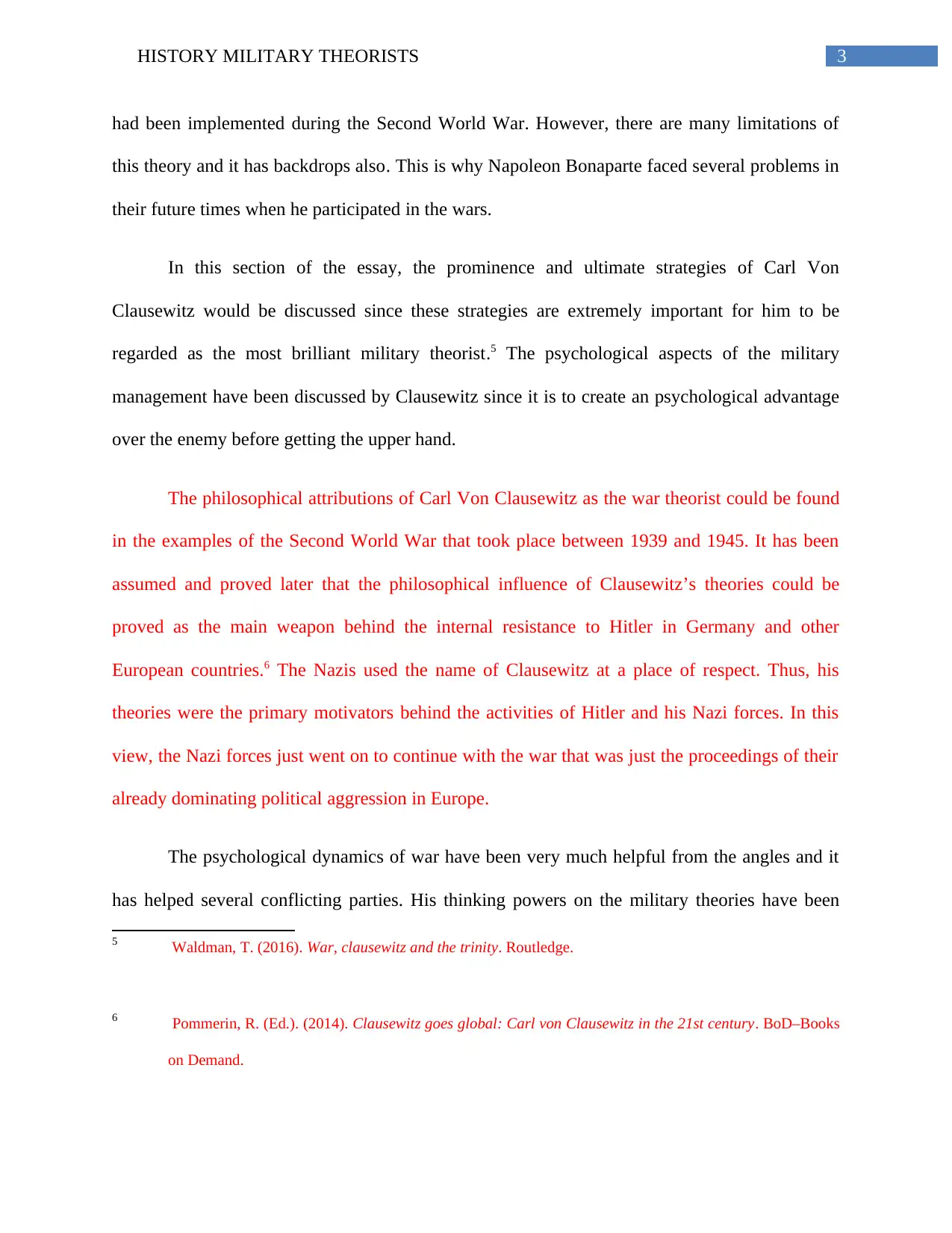
3HISTORY MILITARY THEORISTS
had been implemented during the Second World War. However, there are many limitations of
this theory and it has backdrops also. This is why Napoleon Bonaparte faced several problems in
their future times when he participated in the wars.
In this section of the essay, the prominence and ultimate strategies of Carl Von
Clausewitz would be discussed since these strategies are extremely important for him to be
regarded as the most brilliant military theorist.5 The psychological aspects of the military
management have been discussed by Clausewitz since it is to create an psychological advantage
over the enemy before getting the upper hand.
The philosophical attributions of Carl Von Clausewitz as the war theorist could be found
in the examples of the Second World War that took place between 1939 and 1945. It has been
assumed and proved later that the philosophical influence of Clausewitz’s theories could be
proved as the main weapon behind the internal resistance to Hitler in Germany and other
European countries.6 The Nazis used the name of Clausewitz at a place of respect. Thus, his
theories were the primary motivators behind the activities of Hitler and his Nazi forces. In this
view, the Nazi forces just went on to continue with the war that was just the proceedings of their
already dominating political aggression in Europe.
The psychological dynamics of war have been very much helpful from the angles and it
has helped several conflicting parties. His thinking powers on the military theories have been
5 Waldman, T. (2016). War, clausewitz and the trinity. Routledge.
6 Pommerin, R. (Ed.). (2014). Clausewitz goes global: Carl von Clausewitz in the 21st century. BoD–Books
on Demand.
had been implemented during the Second World War. However, there are many limitations of
this theory and it has backdrops also. This is why Napoleon Bonaparte faced several problems in
their future times when he participated in the wars.
In this section of the essay, the prominence and ultimate strategies of Carl Von
Clausewitz would be discussed since these strategies are extremely important for him to be
regarded as the most brilliant military theorist.5 The psychological aspects of the military
management have been discussed by Clausewitz since it is to create an psychological advantage
over the enemy before getting the upper hand.
The philosophical attributions of Carl Von Clausewitz as the war theorist could be found
in the examples of the Second World War that took place between 1939 and 1945. It has been
assumed and proved later that the philosophical influence of Clausewitz’s theories could be
proved as the main weapon behind the internal resistance to Hitler in Germany and other
European countries.6 The Nazis used the name of Clausewitz at a place of respect. Thus, his
theories were the primary motivators behind the activities of Hitler and his Nazi forces. In this
view, the Nazi forces just went on to continue with the war that was just the proceedings of their
already dominating political aggression in Europe.
The psychological dynamics of war have been very much helpful from the angles and it
has helped several conflicting parties. His thinking powers on the military theories have been
5 Waldman, T. (2016). War, clausewitz and the trinity. Routledge.
6 Pommerin, R. (Ed.). (2014). Clausewitz goes global: Carl von Clausewitz in the 21st century. BoD–Books
on Demand.
Secure Best Marks with AI Grader
Need help grading? Try our AI Grader for instant feedback on your assignments.
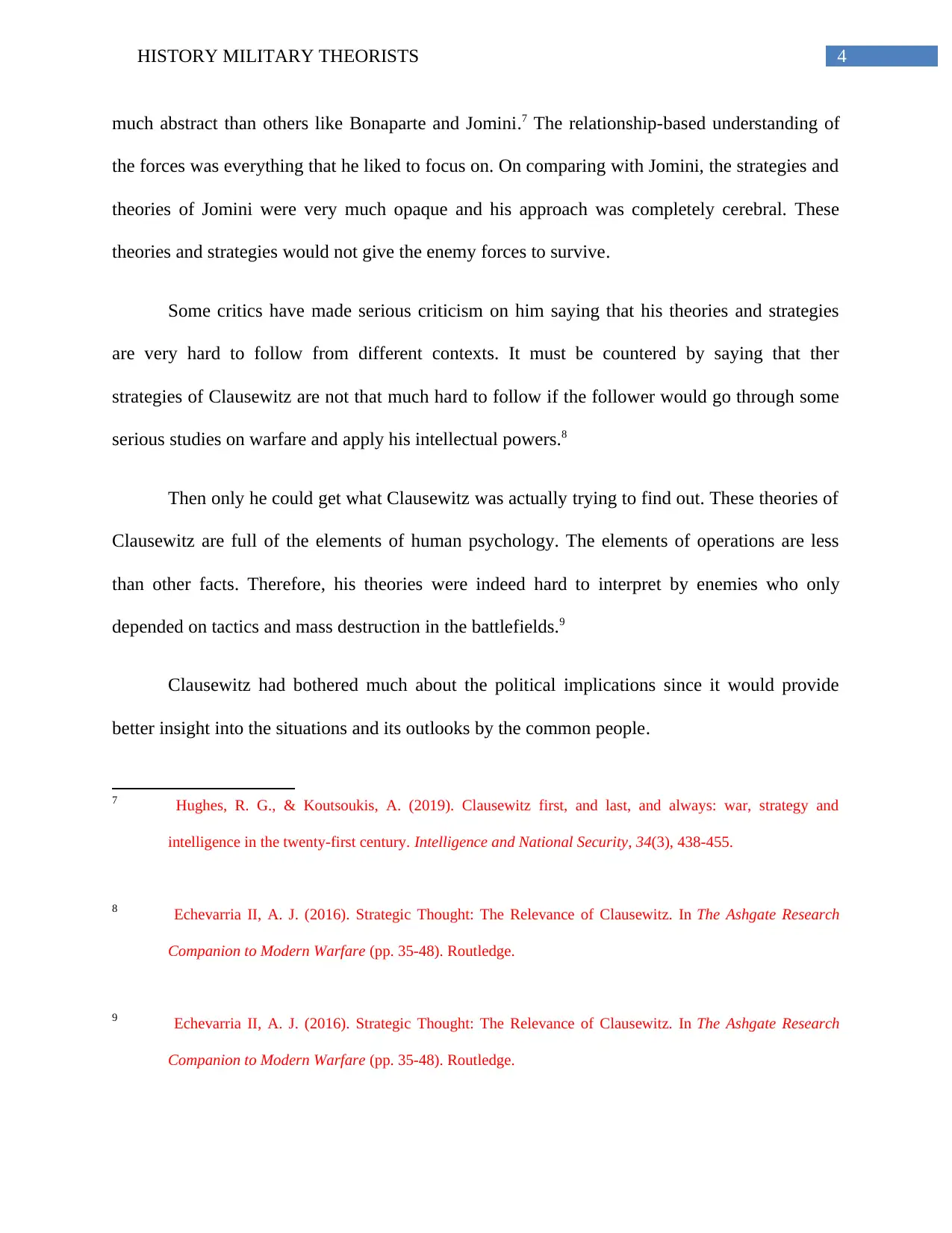
4HISTORY MILITARY THEORISTS
much abstract than others like Bonaparte and Jomini.7 The relationship-based understanding of
the forces was everything that he liked to focus on. On comparing with Jomini, the strategies and
theories of Jomini were very much opaque and his approach was completely cerebral. These
theories and strategies would not give the enemy forces to survive.
Some critics have made serious criticism on him saying that his theories and strategies
are very hard to follow from different contexts. It must be countered by saying that ther
strategies of Clausewitz are not that much hard to follow if the follower would go through some
serious studies on warfare and apply his intellectual powers.8
Then only he could get what Clausewitz was actually trying to find out. These theories of
Clausewitz are full of the elements of human psychology. The elements of operations are less
than other facts. Therefore, his theories were indeed hard to interpret by enemies who only
depended on tactics and mass destruction in the battlefields.9
Clausewitz had bothered much about the political implications since it would provide
better insight into the situations and its outlooks by the common people.
7 Hughes, R. G., & Koutsoukis, A. (2019). Clausewitz first, and last, and always: war, strategy and
intelligence in the twenty-first century. Intelligence and National Security, 34(3), 438-455.
8 Echevarria II, A. J. (2016). Strategic Thought: The Relevance of Clausewitz. In The Ashgate Research
Companion to Modern Warfare (pp. 35-48). Routledge.
9 Echevarria II, A. J. (2016). Strategic Thought: The Relevance of Clausewitz. In The Ashgate Research
Companion to Modern Warfare (pp. 35-48). Routledge.
much abstract than others like Bonaparte and Jomini.7 The relationship-based understanding of
the forces was everything that he liked to focus on. On comparing with Jomini, the strategies and
theories of Jomini were very much opaque and his approach was completely cerebral. These
theories and strategies would not give the enemy forces to survive.
Some critics have made serious criticism on him saying that his theories and strategies
are very hard to follow from different contexts. It must be countered by saying that ther
strategies of Clausewitz are not that much hard to follow if the follower would go through some
serious studies on warfare and apply his intellectual powers.8
Then only he could get what Clausewitz was actually trying to find out. These theories of
Clausewitz are full of the elements of human psychology. The elements of operations are less
than other facts. Therefore, his theories were indeed hard to interpret by enemies who only
depended on tactics and mass destruction in the battlefields.9
Clausewitz had bothered much about the political implications since it would provide
better insight into the situations and its outlooks by the common people.
7 Hughes, R. G., & Koutsoukis, A. (2019). Clausewitz first, and last, and always: war, strategy and
intelligence in the twenty-first century. Intelligence and National Security, 34(3), 438-455.
8 Echevarria II, A. J. (2016). Strategic Thought: The Relevance of Clausewitz. In The Ashgate Research
Companion to Modern Warfare (pp. 35-48). Routledge.
9 Echevarria II, A. J. (2016). Strategic Thought: The Relevance of Clausewitz. In The Ashgate Research
Companion to Modern Warfare (pp. 35-48). Routledge.
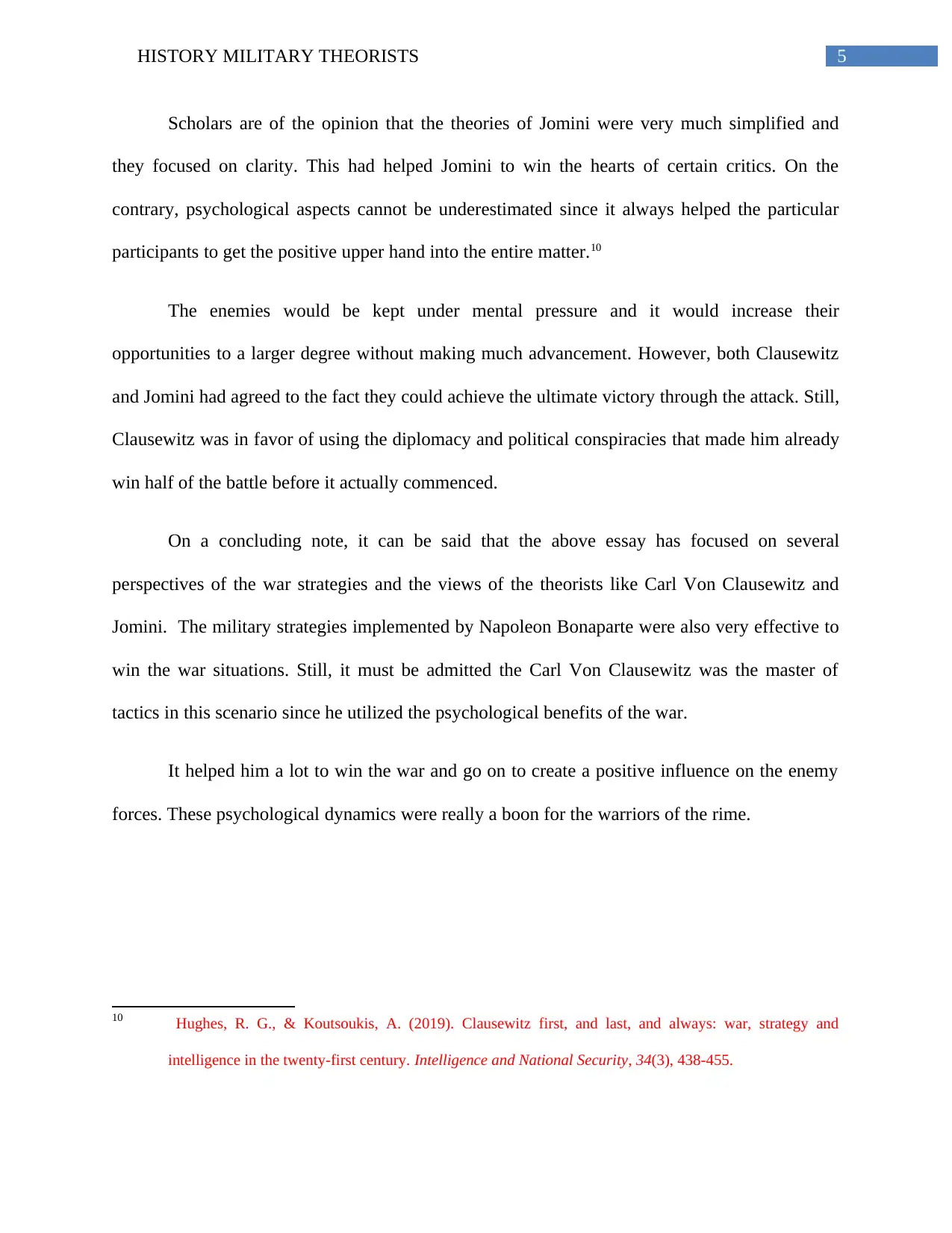
5HISTORY MILITARY THEORISTS
Scholars are of the opinion that the theories of Jomini were very much simplified and
they focused on clarity. This had helped Jomini to win the hearts of certain critics. On the
contrary, psychological aspects cannot be underestimated since it always helped the particular
participants to get the positive upper hand into the entire matter.10
The enemies would be kept under mental pressure and it would increase their
opportunities to a larger degree without making much advancement. However, both Clausewitz
and Jomini had agreed to the fact they could achieve the ultimate victory through the attack. Still,
Clausewitz was in favor of using the diplomacy and political conspiracies that made him already
win half of the battle before it actually commenced.
On a concluding note, it can be said that the above essay has focused on several
perspectives of the war strategies and the views of the theorists like Carl Von Clausewitz and
Jomini. The military strategies implemented by Napoleon Bonaparte were also very effective to
win the war situations. Still, it must be admitted the Carl Von Clausewitz was the master of
tactics in this scenario since he utilized the psychological benefits of the war.
It helped him a lot to win the war and go on to create a positive influence on the enemy
forces. These psychological dynamics were really a boon for the warriors of the rime.
10 Hughes, R. G., & Koutsoukis, A. (2019). Clausewitz first, and last, and always: war, strategy and
intelligence in the twenty-first century. Intelligence and National Security, 34(3), 438-455.
Scholars are of the opinion that the theories of Jomini were very much simplified and
they focused on clarity. This had helped Jomini to win the hearts of certain critics. On the
contrary, psychological aspects cannot be underestimated since it always helped the particular
participants to get the positive upper hand into the entire matter.10
The enemies would be kept under mental pressure and it would increase their
opportunities to a larger degree without making much advancement. However, both Clausewitz
and Jomini had agreed to the fact they could achieve the ultimate victory through the attack. Still,
Clausewitz was in favor of using the diplomacy and political conspiracies that made him already
win half of the battle before it actually commenced.
On a concluding note, it can be said that the above essay has focused on several
perspectives of the war strategies and the views of the theorists like Carl Von Clausewitz and
Jomini. The military strategies implemented by Napoleon Bonaparte were also very effective to
win the war situations. Still, it must be admitted the Carl Von Clausewitz was the master of
tactics in this scenario since he utilized the psychological benefits of the war.
It helped him a lot to win the war and go on to create a positive influence on the enemy
forces. These psychological dynamics were really a boon for the warriors of the rime.
10 Hughes, R. G., & Koutsoukis, A. (2019). Clausewitz first, and last, and always: war, strategy and
intelligence in the twenty-first century. Intelligence and National Security, 34(3), 438-455.
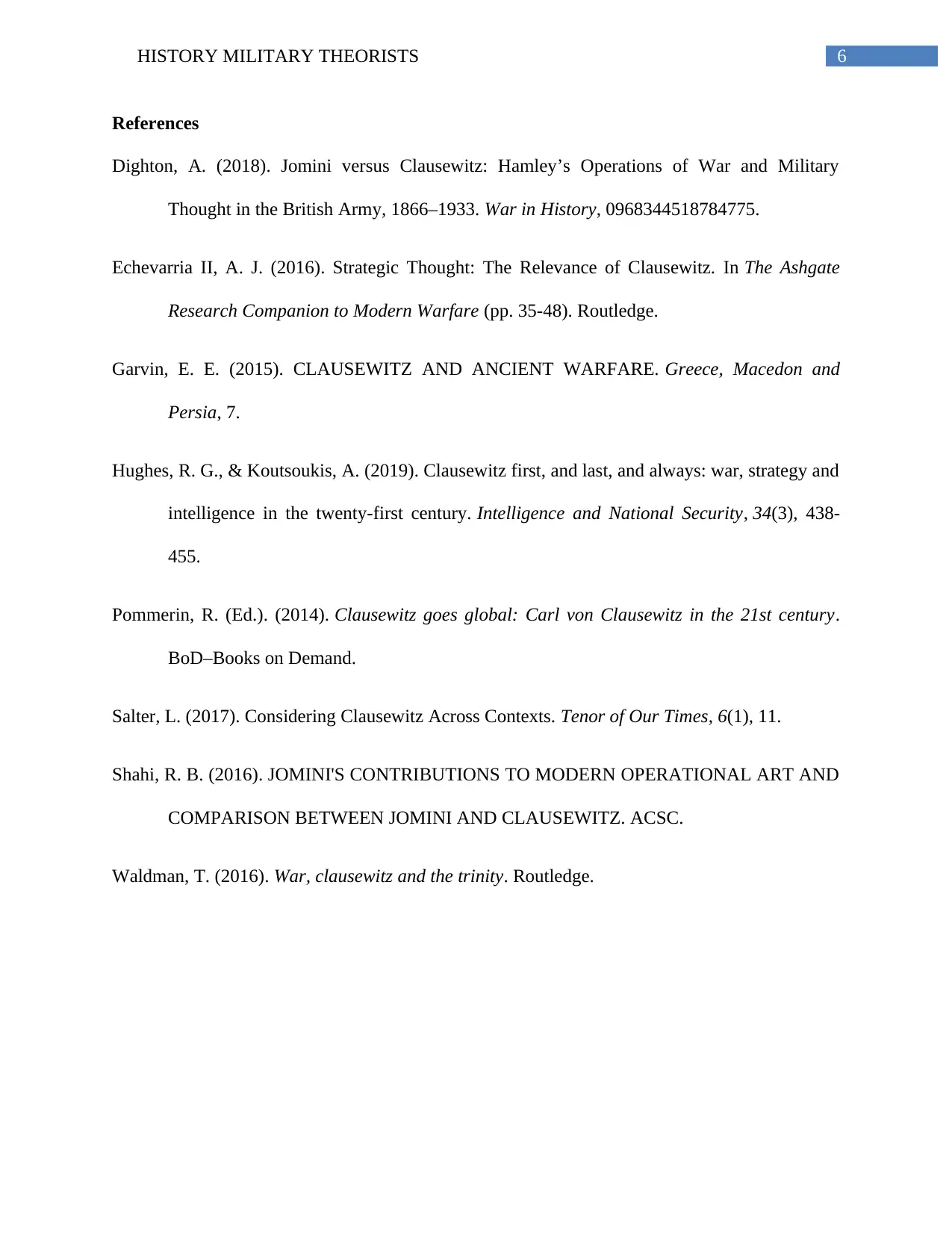
6HISTORY MILITARY THEORISTS
References
Dighton, A. (2018). Jomini versus Clausewitz: Hamley’s Operations of War and Military
Thought in the British Army, 1866–1933. War in History, 0968344518784775.
Echevarria II, A. J. (2016). Strategic Thought: The Relevance of Clausewitz. In The Ashgate
Research Companion to Modern Warfare (pp. 35-48). Routledge.
Garvin, E. E. (2015). CLAUSEWITZ AND ANCIENT WARFARE. Greece, Macedon and
Persia, 7.
Hughes, R. G., & Koutsoukis, A. (2019). Clausewitz first, and last, and always: war, strategy and
intelligence in the twenty-first century. Intelligence and National Security, 34(3), 438-
455.
Pommerin, R. (Ed.). (2014). Clausewitz goes global: Carl von Clausewitz in the 21st century.
BoD–Books on Demand.
Salter, L. (2017). Considering Clausewitz Across Contexts. Tenor of Our Times, 6(1), 11.
Shahi, R. B. (2016). JOMINI'S CONTRIBUTIONS TO MODERN OPERATIONAL ART AND
COMPARISON BETWEEN JOMINI AND CLAUSEWITZ. ACSC.
Waldman, T. (2016). War, clausewitz and the trinity. Routledge.
References
Dighton, A. (2018). Jomini versus Clausewitz: Hamley’s Operations of War and Military
Thought in the British Army, 1866–1933. War in History, 0968344518784775.
Echevarria II, A. J. (2016). Strategic Thought: The Relevance of Clausewitz. In The Ashgate
Research Companion to Modern Warfare (pp. 35-48). Routledge.
Garvin, E. E. (2015). CLAUSEWITZ AND ANCIENT WARFARE. Greece, Macedon and
Persia, 7.
Hughes, R. G., & Koutsoukis, A. (2019). Clausewitz first, and last, and always: war, strategy and
intelligence in the twenty-first century. Intelligence and National Security, 34(3), 438-
455.
Pommerin, R. (Ed.). (2014). Clausewitz goes global: Carl von Clausewitz in the 21st century.
BoD–Books on Demand.
Salter, L. (2017). Considering Clausewitz Across Contexts. Tenor of Our Times, 6(1), 11.
Shahi, R. B. (2016). JOMINI'S CONTRIBUTIONS TO MODERN OPERATIONAL ART AND
COMPARISON BETWEEN JOMINI AND CLAUSEWITZ. ACSC.
Waldman, T. (2016). War, clausewitz and the trinity. Routledge.
1 out of 7
Related Documents
Your All-in-One AI-Powered Toolkit for Academic Success.
+13062052269
info@desklib.com
Available 24*7 on WhatsApp / Email
![[object Object]](/_next/static/media/star-bottom.7253800d.svg)
Unlock your academic potential
© 2024 | Zucol Services PVT LTD | All rights reserved.





